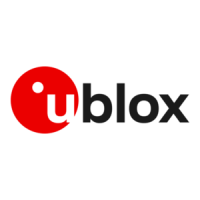NINA-B3 series - System integration manual
UBX-17056748 - R13 Handling and soldering Page 45 of 72
C1-Public
4.3.1 Reflow soldering process
NINA-B3 series modules are surface mounted devices supplied on a FR4-type PCB with
gold-plated connection pads. The modules are manufactured in a lead-free process with lead-free
soldering paste. The bow and twist of the PCB is maximum 0.75% according to IPC-A-610E.
The thickness of solder resist between the host PCB top side and the bottom side of the NINA-B3
series module must be considered for the soldering process.
NINA-B3 modules are compatible with the industrial reflow profile for common SAC type RoHS
solders. No-clean soldering paste is strongly recommended.
The reflow profile is dependent on the thermal mass of the entire populated PCB, the heat transfer
efficiency of the oven, and the type of solder paste that is used. The optimal soldering profile that is
used must be trimmed for each case depending on the specific soldering process and PCB layout.
The target parameter values shown in Table 11are only general guidelines for a Pb-free process. The
given values are tentative and subject to change. For further information, see also the JEDEC
J-STD-020C standard [5].
Table 11: Recommended reflow profile
Figure 17: Reflow profile
☞ Lower value of T
P
and slower ramp down rate (2 – 3 °C/sec) is preferred.
☞ After reflow soldering, optical inspection of the modules is recommended to verify proper
alignment.

